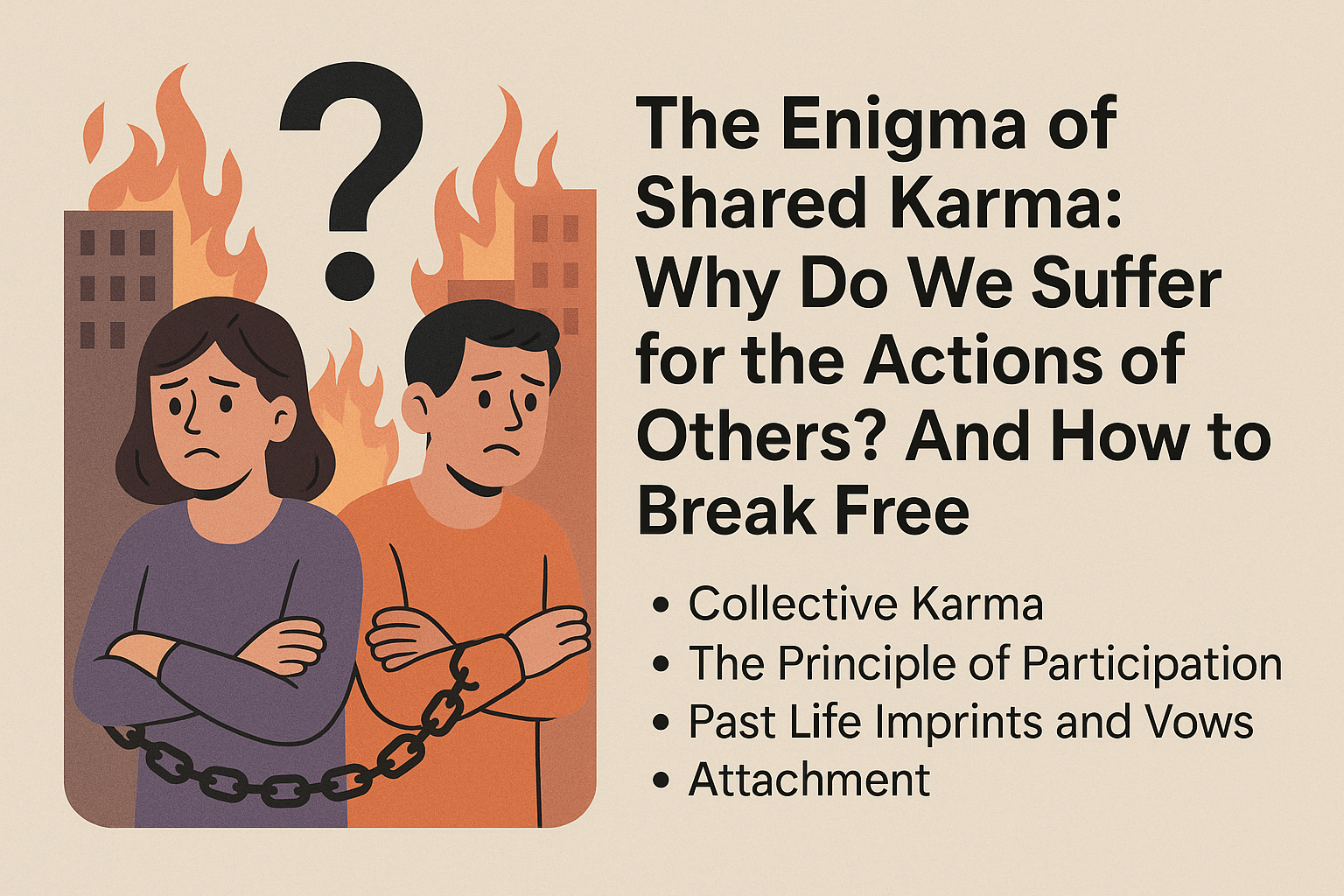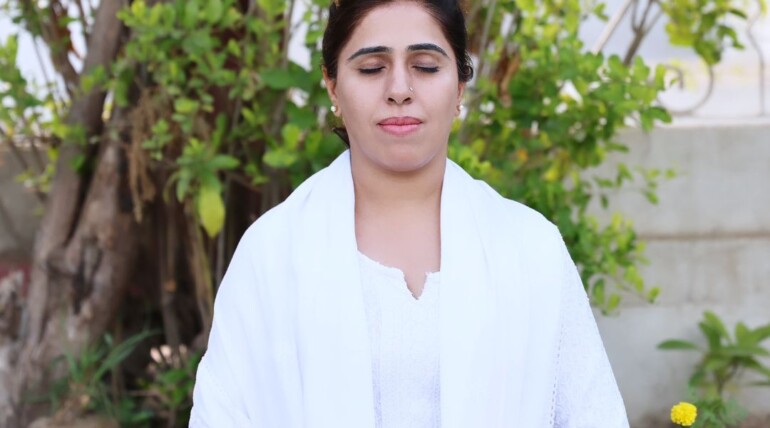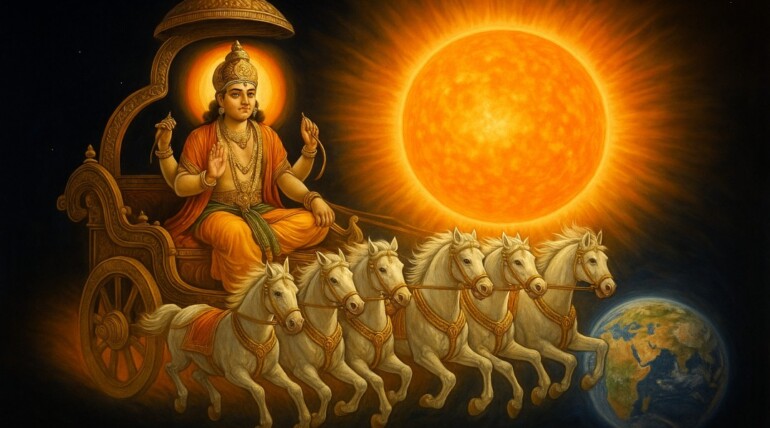The human mind, in its quest to understand life’s challenges, often grapples with a profound question: why do seemingly innocent individuals suffer due to the actions of others? This question arises during personal tragedies and global events alike. It challenges our basic sense of justice and fairness.
The speaker sets the stage by highlighting how suffering can appear random. Peaceful people, engaged in daily routines, sometimes become victims of others’ malicious acts. Families and communities face the consequences of actions they had no part in. Even the relatives of wrongdoers—who may be entirely innocent—experience backlash. This interconnected suffering reflects the ancient concept of karma bandhan (karmic bonds).
Drawing from Sanatan Dharma, including the Bhagavad Gita, Upanishads, and Yoga Vasistha, the discourse explains that karmic accounts are shared among souls bound by deep connections. This happens in families, societies, and even nations.
1. Collective Karma (Samyukt Karma)
In close-knit groups, one person’s negative actions can affect everyone. For example, a terrorist’s family may suffer social and economic consequences despite being uninvolved. Similarly, a child born with a severe condition may pass away soon after birth, leaving parents in debt. This could be a karmic settlement from past lives. Our births and relationships are not random; they arise from unresolved karmic ties.
2. The Principle of Participation
Even passive agreement with wrongdoing can result in karmic consequences. If locals knowingly shelter a criminal, their silence becomes complicity. This echoes the Mahabharata, where silence during Draupadi’s disrobing led to downfall. Choosing neutrality in the face of injustice is itself a karmic act.
3. Past Life Imprints and Vows
We carry forward karmic patterns and connections from past lives. The people we meet today may be part of ongoing karmic interactions. Our “karmic ledger” keeps track of credits and debts across lifetimes. Thus, present suffering may be the result of unresolved past accounts.
4. Attachment (Asakti)
Attachment amplifies suffering. We grieve deeply when loved ones suffer but feel indifferent to strangers. The story of Abhimanyu’s soul comforting Arjuna illustrates how sorrow stems from attachment, while the soul sees death as the completion of a role.
The Path to Liberation: Breaking Free from Shared Suffering
1. Witness Consciousness (Sakshi Bhava)
Realize that we are souls, not the body or mind. Observe life’s events as a detached witness. This shift in identity—affirming “I am a soul, a witness”—helps reduce emotional turmoil and karmic entanglement.
2. Detachment from Outcomes (Karma Phala Asakti)
Act without attachment to results. As the Gita says, “You have the right to perform your duty, but not to its fruits.” When actions are performed selflessly, without expectation, they do not bind us. Conclude karmic accounts with pure intentions (shubh bhavna) and good wishes (shubh kamna), as taught in Brahma Kumaris philosophy.
3. Raj Yoga and Meditation
Regular meditation strengthens the soul and purifies consciousness. A strong spiritual aura protects against negative karmic influences. Over time, we naturally distance ourselves from harmful environments.
4. Discernment and Distance (Viveka)
If certain individuals or environments consistently cause harm, create distance. Staying in toxic connections despite awareness is also a karmic act. Limit emotional entanglements, even in family, and focus on fulfilling duties with detachment. The ultimate relationship is with the Divine.
5. Divine Protection
Through remembrance (smriti) and yoga, establish a connection with the Supreme Soul. This creates a spiritual shield around us. The Gita assures that divine remembrance leads to the destruction of sin and eventual liberation. Practices like Soham meditation reaffirm our divinity and bring inner peace.
Karmic Burdens of Free Indulgence
Seeking free pleasures—whether food, gifts, or experiences—can increase karmic bonds. The example of repeatedly eating free meals (like langar) without serving or contributing demonstrates this. Even well-intentioned offerings carry energy. When we accept without giving back, karmic debts form.
Therefore, serve where you receive. Don’t indulge out of greed. If you take, give. If you receive, contribute.
Karma and Personal Accountability
We suffer others’ karma only when we’ve accepted the connection at some level—mentally, emotionally, or spiritually. Thinking “This is God’s gift, so I’ll enjoy it” is a subtle form of entitlement. But God does not deliver meals. Every being earns and eats by their own karma. Billions suffer globally—not because the divine is cruel, but because of the laws of karma.
Don’t question who came or left. Each soul has its own momentum, its own karmic trajectory. Focus on detachment and rising above ego.
Dispelling Myths and Facing Reality
Children are not gifts dropped from heaven; they manifest through desires and karmic patterns. If divinity were truly giving them, it would also provide their sustenance. But millions die of hunger. In Gaza, in Africa, in war zones—suffering is universal. No divine hand intervenes visibly. This shows that even faith-based communities abandon their own in crisis. Karma—not charity or divine intervention—governs outcomes.
Freedom Through Self-Realization
Witness consciousness, pure intentions, yoga, and discernment free us from karmic cycles. See every person as a soul—not an uncle, aunt, or friend. Souls have only one eternal relationship—with the Supreme Soul.
The Gita says, “Remember Me, and I shall lift you.” Until karma dissolves, remain steady (sthita-pragnya) and unmoved by others’ joys or sorrows. True bliss comes from contemplation of the Supreme.
The Power of Spiritual Knowledge
Spiritual knowledge is like nectar. Listening to satsang or contemplating the Self refreshes and heals the soul, like bathing cleanses the body. Even a moment of connection with the Supreme can erase hours of stress.
The Role of Practice and Sharing
Knowledge is meaningful only when practiced. Meditate on it. Share your realizations with others. Your podcast, video, or experience might awaken someone else.
As one example, a popular video by Sakshi reached millions and inspired many. Such content can uplift countless souls. Every person has value. Every realization is sacred. Share your journey and raise the collective vibration.
Ultimate Truth: Satyam Shivam Sundaram
We are Truth. We are Shiva. We are Beauty. Recognize your soul. Become a world-benefactor. The knowledge of Behad (Infinite) offers the path not just out of the universe—but out of the multiverse itself. Bapuji’s vision points the way beyond all realms.
This simple yet profound wisdom can awaken anyone at the right time. Like a drop of water to a dying man in a desert, the right knowledge at the right moment brings life. Practice it. Live it. And let it transform you.





1 Comment
Dr. Deepali
This article beautifully explains the concept of karma and its impact on our lives. The examples and references from scriptures make it relatable and easy to understand.
This article has the potential to transform lives. The wisdom shared is profound and can bring about a significant shift in one’s perspective